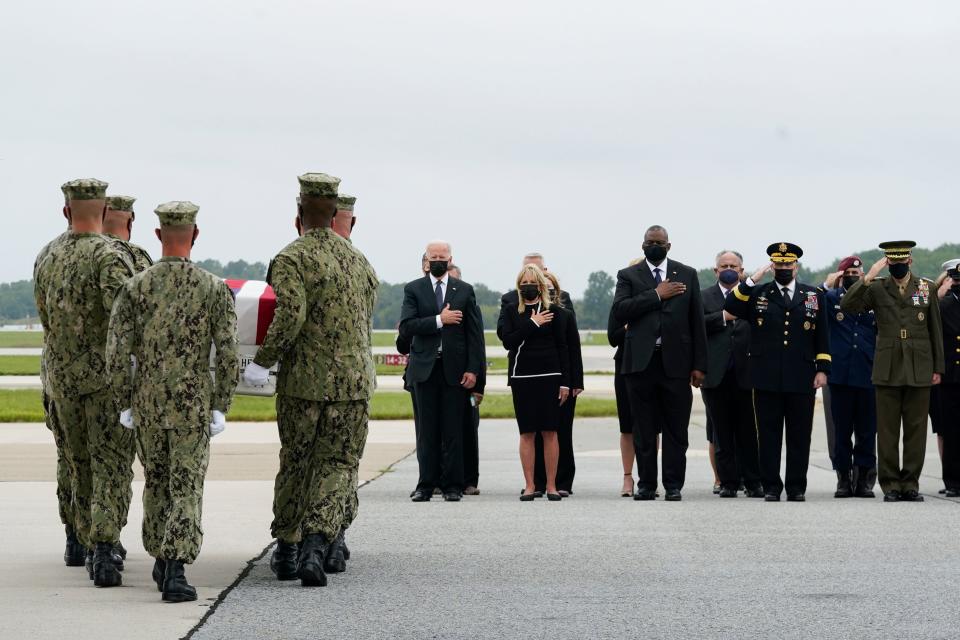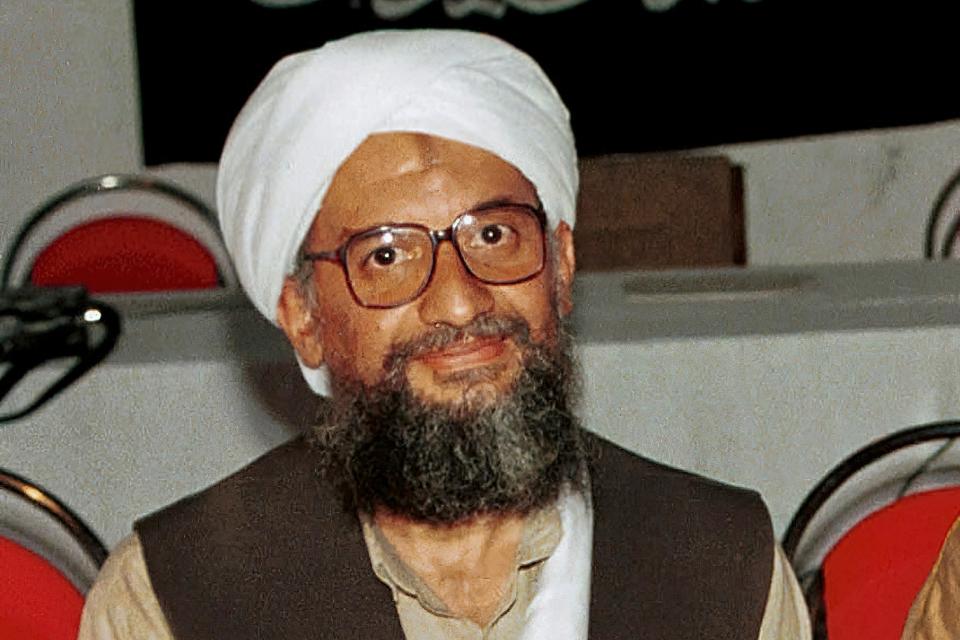Botched withdrawal scarred Biden's presidency, plunged Afghanistan further into strife
- Oops!Something went wrong.Please try again later.
Tuesday will be a year since the last U.S. troop left Afghan soil. Neither the country we spent two decades fighting for nor Joe Biden's presidency have been the same since.
Sadly, on two points, there is little room for debate. First, the people of Afghanistan are far worse off today than before, as nearly half of them face acute food insecurity. Second, by making his own leadership and the United States appear weak and irresolute as Kabul fell, Biden started a process that has made him one of U.S. history's least popular presidents at this point of his tenure – even though I believe his overall foreign policy record is actually better than perceived.
Top al-Qaida leader Ayman al-Zawahri killed in Kabul
Many other issues that have left Americans worried and upset in recent times are largely beyond Biden’s control – COVID-19, Russian President Vladimir Putin’s invasion of Ukraine, the ensuing damage to the economy that includes inflation. But he, and he alone, owns the disastrous Afghanistan withdrawal.

Not all the news from that part of the world is bad. The United States achieved an important counterterrorism success with the killing of al-Qaida ringleader, mastermind and founding father Ayman al-Zawahri in Kabul last month.
Although he was perhaps no longer as involved in plotting specific acts of violence against the United States, al-Zawahri represented a resilient and defiant figure on the world stage who had somehow eluded the world’s superpower for decades, contributing to the deaths of thousands of innocents over the course of his career. Kudos to the U.S. intelligence community for the patient and perseverant work that was required to make this strike possible.
Jack McCain: Four years after the death of John McCain, my father's legacy is more important than ever

But the fact that al-Zawahri was in Afghanistan at the time, living in a safe house belonging to part of the Haqqani network – a group that contributes substantially to the overall ranks of the Taliban and their leadership – demonstrates that the Taliban were violating the deal they made with President Donald Trump in February 2020.
By that accord, which Biden used to justify the U.S. and NATO military pullout from the country last year, the Taliban promised to pursue meaningful power-sharing talks with Afghanistan's then-government and avoid providing support to al-Qaida.
Perhaps the Taliban thought sheltering an aging al-Zawahri only constituted a white lie of sorts – a small act of mercy for an old friend. Perhaps the Taliban will not actually aid, or even tolerate, any al-Qaida effort to plot new attacks. We will have to see.
Fall of Kabul, fall of Saigon: Their horror was our horror. Anguished, we pray for a miracle
Proof U.S. can fight 'over the horizon'
At least in this case, we have shown we can sometimes do “over-the-horizon” counterterrorism without boots on the ground. This would seem to support Biden's contention that he was right to end the U.S. military mission last year.
But it will be harder to understand the actions and plans of people we do not know – the next generation of leaders and killers – without access to the streets, coffee shops, markets and mosques of the country. Keeping 5,000 U.S. troops in Afghanistan indefinitely to help support an Afghan military and intelligence apparatus that could do such things struck me as a modest investment in sustaining such human intelligence networks.
Is this a war crime?: He was killed by a Russian bomb while playing dominoes in Ukraine
This debate will go on. One can argue either side – and lots of folks are doing so, usually in predictable ways based on their political affiliation.
On balance, Biden’s foreign policy record is actually OK, but the tone and trajectory of how it is perceived were largely set last summer in a way the president may never fully recover from.
Biden and team have otherwise made some wise decisions in the course of this now middle-age presidency.
Smart posture on Russia and China
Crucially, on Ukraine, Biden rightly decided that the United States should not directly enter into the conflict and risk World War III over a part of Europe that, while important, is not vital to U.S. national interests. We take this decision for granted, but it remains enormously important. At the same time, he wisely decided to provide massive security, economic and intelligence assistance. Now NATO is united and strengthening.
Biden could have tried harder to prevent the war by being willing to discuss alternatives to NATO membership for Ukraine with Russia. I wish he had. But that, admittedly, would have been difficult to do at the barrel of a gun, given Putin’s bullying brinkmanship.
Opinion alerts: Get columns from your favorite columnists + expert analysis on top issues, delivered straight to your device through the USA TODAY app. Don't have the app? Download it for free from your app store.
On China policy, Biden has been right to keep some Trump-era tariffs, otherwise push back against Chinese economic theft, focus the Pentagon’s long-term modernization and investment strategies on China, and try all the while to keep communications channels open. But the Biden administration, like Trump's, has overdone it a bit, increasingly treating China as a likely adversary and overdoing its criticisms at times.
I am less happy with policy toward Iran and North Korea, where there seems to be little creativity in Biden circles, and a sense of autopilot.
Is House Speaker Pelosi's visit to Taiwan a risk? Yes, but she can deliver strong messages to China
On American military strength, Biden has benefited from bipartisan support in Congress for a strong defense posture, together with a smart emphasis on "integrated deterrence" that seeks to use military and economic power to dissuade China from aggression. And Biden’s occasional public statements that the United States would defend Taiwan in a war, even if ad-libbed, could be useful for showing resolve, even as official policy remains more noncommittal.
It is not a resounding record of success, but I’d give it two cheers nonetheless.
The unforced error of pulling out of Afghanistan so precipitously and carelessly – and needlessly – hangs over all of this, making the public image of Biden as a world leader less positive than his record deserves.
There is a lesson there about the importance of avoiding unforced errors in world affairs. But thankfully, on balance I would also say we have a competent foreign policy team and president leading U.S. national security policy today.
Michael O’Hanlon, a senior fellow at the Brookings Institution and a member of USA TODAY's Board of Contributors, is author of "The Art of War in an Age of Peace: U.S. Grand Strategy and Resolute Restraint." Follow him on Twitter: @MichaelEOHanlon
You can read diverse opinions from our Board of Contributors and other writers on the Opinion front page, on Twitter @usatodayopinion and in our daily Opinion newsletter. To respond to a column, submit a comment to letters@usatoday.com.
This article originally appeared on USA TODAY: President Joe Biden alone to blame for botched Afghanistan withdrawal

